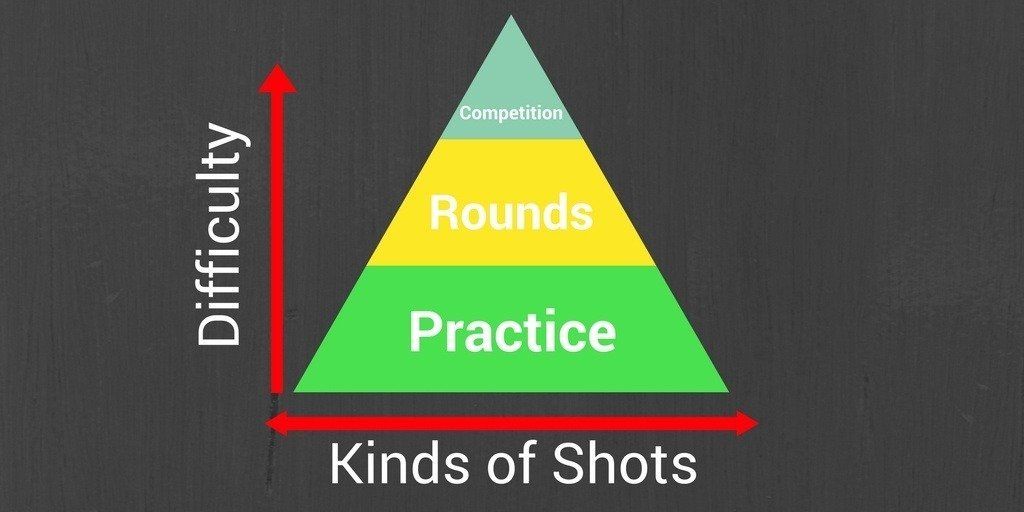
Expectation management is fundamental to becoming a better golfer. When it comes to strategy and which golf shots we choose to execute on the course, it can be the difference between success and failure. In this article I want to explore a concept that has taken me more than 20 years to learn, and I believe it can help your game. I call it the "golf shot pyramid."
Recently I received an email from a reader asking about a competitive round he had approaching the following week. The course he was playing was more different than his home track. He wanted to know if he should be practicing several new shots that he believed would benefit him during the competition.
My advice was to stick with what he was currently comfortable with, and not try out any new shots. I'd like to introduce a simple concept called the "golf shot pyramid." I will take you through the three levels of the pyramid, and hopefully it will give you a new perspective on what are reasonable expectations when learning new kinds of golf shots.
What is the Pyramid
Golfers on the whole are very unrealistic with their abilities, and it often results in major mistakes during rounds. That is because there is a major difference between the practice environment, a normal round of golf, and a competitive situation. These are the three levels of the pyramid.
Most of us fall into the trap that there is no difference, and if we can pull off a shot in practice then that means we should expect to do the same on the course. This couldn't be further from the truth for a number of reasons.

As you can see there are two parts to the pyramid - the width and the height. As we move up, the difficulty increases. Additionally, the width of the pyramid begins to narrow. That represents the types of golf shots you can execute.
For example, in practice you might be able to pull off 6 or 7 kinds of short game techniques - bump and run, flop shots etc. However, as you move up to a round of golf, and then to a competition, all of a sudden you are only able to execute one or two of those shots when the pressure is really on.
This is the framework of what your expectations should be when it comes to golf shots. As we move up the pyramid and the pressure increases, layers get stripped away from your game.
Practice
The practice environment is the time where you should be honing techniques that you are comfortable with. It also should be your testing ground, and where you experiment with new shots.
I have always believed that the golf swing is constantly changing on us. The kinds of shots I used to play as a child are radically different than the ones I play now. That is why I believe experimentation is at the heart of improvement (which I wrote about in my book). You need a place where there is no pressure and you can try new things.
If you are trying to learn new golf shots, this is the first stage. You are simply seeing if you are physically capable of pulling off the shot, and making small changes to get your desired outcome. Once you feel you have crossed that bridge then I would advise putting more pressure on yourself. Play performance games, and if possible take that shot out on the golf course in a practice situation where you are not keeping score.
Once you feel you have achieved proficiency, then you can move on to the next level in the pyramid.
Your Rounds
For most golfers a typical round of golf is the main stage for their games. They want to shoot their best scores and the pressure is very real. The gap between practice and a live round is large, and it should be respected. Your new golf shot is not going to be nearly as easy to execute because now you only have one chance.
This is the trap most golfers fall into. They expect to take a newly-conceived shot from the practice environment quite easily to the course.
That doesn't mean you should be afraid to try a new shot out. My point is that your expectations need to be tempered. Sometimes it turns out that things we can do in a practice environment simply won't translate to the course. For example, I can pull off all kinds of Phil Mickelson-esque flop shots in my backyard. I don't have the confidence (or guts) to use them in a real round. This is because my skill level is not even close to his, and I believe my margin of error is too large.
My advice to you is once you take your new shot from the incubation stage in your practice environment, start to try it out during your rounds. Don't be afraid to fail. Keep close track whether or not you feel comfortable using it, and if you are seeing positive results. I can't give you any kind of true litmus test, but I think it makes sense to ask yourself the following questions:
Can I execute this shot more often than not during a real round?
Does this shot give me a better chance of shooting lower scores?
Am I comfortable even trying it, or do I get too nervous?
Eventually I think the answer to all of those questions should be yes. If it isn't, then maybe it's best to remove it from your repertoire. Some golfers believe they should have this enormous catalog of shots to choose from. I am of the mind that you should be able to execute a smaller range of techniques very well rather than a larger selection of mediocre ones.
I believe you want to be the 5-star restaurant that has several great dishes rather than the local diner with the large menu of just "OK" food.
Competition
For some of you reading this, the competitive phase of the pyramid might not apply. I am going to define this as any situation where you are competing against other golfers. It could be for a $5 Nassau with some buddies, or at a U.S. Open Qualifier. This is a situation where there is even more pressure on your game to perform than just a normal recreational round.
Competitive golf strips away another layer of your confidence. All of a sudden the new shot that made it through the practice phase, then into your rounds, will face the ultimate test. Do you have the confidence to pull it off when things are really on the line?
We see this all of the time, even at the pro level. Players who race to the top of the leaderboards earlier in tournaments all of a sudden hit walls. Shots they were pulling off without any issues on Thursday turn into their weakness on Sunday.
As you know golf is an intensely psychological game. You need to be aware that under the most amount of pressure almost any shot can become difficult, even the ones that are seemingly routine for you in regular rounds. Don't panic, it's OK! That is simply the nature of the beast.
This gets back to the original question from the reader of the site who asked if he should try out new shots he just learned in a tournament situation. My advice is to hold back until you have proven yourself in the first two levels of the pyramid. The likelihood is that you will not succeed unless you prove it to yourself beforehand.
Competition is usually not the place to try untested golf shots.
Wrapping it up - The Sequence of New Golf Shots
I have discussed a few different things in this article, but let me neatly wrap this up with an example.
Let's say you want to learn how to play a low hook shot to use in the wind, or to get out of trouble. First you need to experiment with the technique necessary to produce this ball flight in your practice sessions. Once you feel you have settled on something you can repeat, start adding pressure using a performance game or try practicing on the course from a cluster of trees.
If you are feeling good about this shot, then start using it during real rounds. Pay close attention to your comfort level. Keep track of your successes or failure. Do you feel you can execute it more often than not? Is it actually making you a better golfer? If the answer eventually becomes yes, then keep the shot!
Lastly, if you are playing competitive golf start trying it out in those situations. If you are seeing similar positive results then that shot has conquered the pyramid!
My main message is to respect the different levels of golf that test all of your shots. There can be very large gaps, and if you can manage your expectations and be patient you will have a much better chance of success.
We care about the protection of your data Read our Privacy Policy